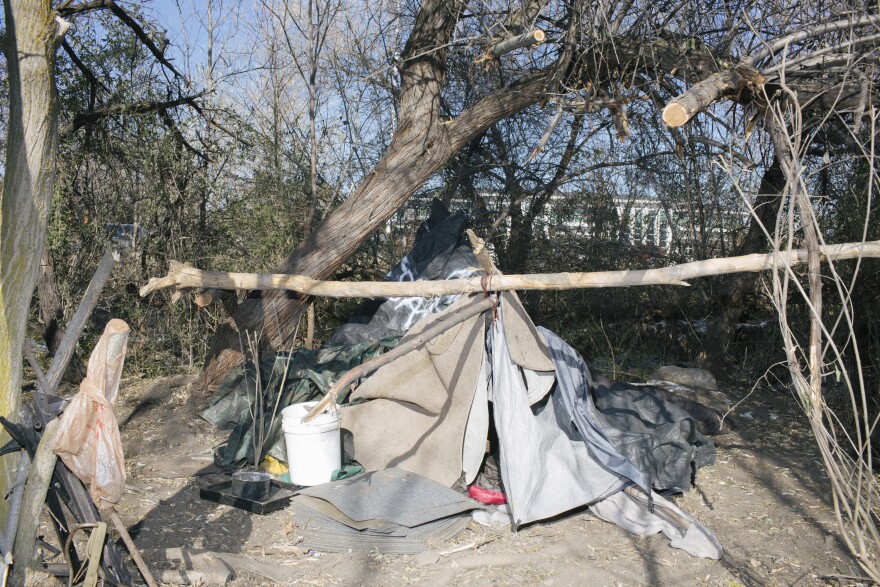Lake Effect contributor, Jan Wilberg shares her experience volunteering in homeless outreach, and an interaction that left her reflecting on herself and what it means to be homeless in her essay, "The Night I Met Jimmie."
It was my third night volunteering on the homeless outreach bus. There was light snow, but it wasn’t cold enough for warming rooms to open. This meant that homeless people would be in the woods, under bridges, in alleys. Our job was to find them and give them food and supplies.
There were four of us on the bus – all women. Two team leaders and a nurse. And me. I’d spent years doing research about homelessness but now, newly retired, I wanted a more personal connection. I wanted to be a different kind of person, but it was scary. New.
I liked being on the outreach bus and being with women who called themselves “Hope Dealers.” The bus was a traveling supply bank, outfitted with storage bins holding socks, underwear, gloves, and hoodies, flashlights, batteries, deodorant, hand warmers, and first aid supplies. Stowed in piles in the back were blankets, sleeping bags, tarps, tents, and coats. Large, insulated bags held hot dinners prepared by volunteers. On the shelf were bag lunches made by a Girl Scout troop; a heart and message had been drawn on each bag. We love you! Don’t give up! You have a friend!
Once we pulled up to a stop on the route, my job was to put a hot meal and bag lunch in a plastic bag for each person waiting at the door or for the volunteer heading out to investigate under a bridge. Filling supply requests came next. The work kept me an arms-length away from homeless folks.
Midway through the route, we stopped next to a large field. Several hundred yards away were railroad tracks and, on the other side, thick, very dark woods. Team leader Shelly reached for a big flashlight behind the driver’s seat and motioned to me.
“Do you want to come along?” I didn’t really. I liked being in the lit space of the bus, but I nodded yes. We were going into the woods to see Jimmie and I should bring two hot dinners and two bag lunches.
We crossed the field and railroad tracks, then inched down an icy hill. There were a few torn tents, evidence of someone having lived there or maybe still living there but not being ‘home’ at the moment. I was too new to know.
The path was icy in spots, rocks underfoot and tree branches slapping us in the face. “Be careful of that root there. Don’t trip.”
I fixed my eyes on Shelly’s light. Being in the woods in the dark was the stuff of my childhood nightmares. I wasn’t lost, though, or alone.
In seconds, the woods went from pitch black to fluorescent white. Shelly kept walking but I stopped on the trail, worried there was a police raid going on. At the same time, heavy metal music blared. This was Jimmie’s greeting.
He sat in a straight-back wooden chair in front of a patched together plywood shack with a wooden sign on the door that said, “Jimmie’s Place.” He wore a heavy jacket and a wool cap but no shoes, only socks, big thick heavy socks that made his feet look like giant loaves of bread.
Jimmie looked like a man who owned the joint. Near his shack were two tents with blue tarps strung over clotheslines. There was a rusted barbecue grill with a propane canister leaning on its side. White plastic lawn chairs and milk crates were grouped as if for a party. Christmas lights glowed in the trees. He had made a home here. And now he sat in his chair and welcomed us like we were walking up the sidewalk to his front porch.
“This is Jan,” Shelly said. I handed him the dinners and bag lunches. Jimmie talked fast, answering questions about what had happened and how he was feeling. I couldn’t make out all they were saying, the two of them huddled off to the side, but I knew the topic was his feet.
They were the only part of him that was obviously not right. I heard “hospital” and “prescriptions.” I caught that he couldn’t walk and wondered how he’d gotten from the street back to his camp.
Jimmie asked for batteries and gloves and Shelly said we would bring them in a few days. Then we had to go, there were more people to see. Jimmie stood, teetering on his bandaged, socked feet. He hugged Shelly and then reached to hug me, laughing because I hung back. It seemed like the laugh of a friend.
We left Jimmie’s camp and retraced our steps back to the bus and then I asked.
“What’s wrong with his feet?”
“He got frostbite and they had to amputate his toes.”
She didn’t offer any more and I didn’t ask. It was up to me to make sense of what I’d seen.
I tried to sort it out for days – the shack in the woods, the security light, the loud music, Jimmie’s feet. I wondered what he ate on the nights we didn’t come, when he’d be able to walk out of the woods. I remembered his teasing and laughing and how he was so at ease with himself and with us. But I never did make sense of it – if there was sense to be made. I just accepted it all which was the point, I guess, all along.




